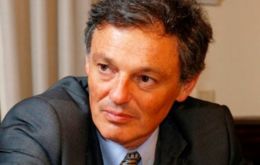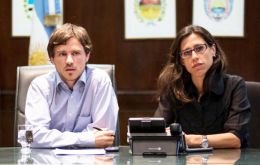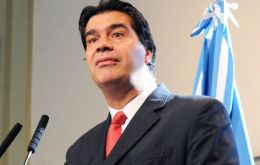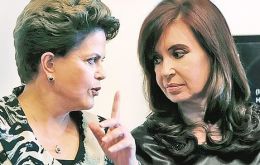MercoPress. South Atlantic News Agency
Tag: restrictive measures
-
Wednesday, December 16th 2015 - 08:10 UTC
Argentina on track to end import restrictions by end of the year

President Mauricio Macri's administration announced the end of restrictions on imports into Argentina, with the current controls of 'sworn statements' or DJAI, replaced by a system of automatic and semi-automatic licences.
-
Wednesday, January 21st 2015 - 07:05 UTC
Argentina confirms customs imports restrictions despite WTO ruling

The administration of president Cristina Fernandez confirmed to Argentine business leaders that customs restrictions on imports will stay in place, despite strong international pressure for barriers to be lifted.
-
Saturday, January 17th 2015 - 08:03 UTC
Argentina downplays WTO adverse ruling and considers possible negotiations with litigants

The World Trade Organization (WTO) ruling against Argentina triggers “no immediate modification” of the country’s trade administration, Cabinet Chief Jorge Capitanich pointed out adding a “comprehensive and detailed analysis of the ruling’s terms” is needed.
-
Tuesday, April 22nd 2014 - 06:26 UTC
Brazil and Argentina clash over auto-export restrictions; top level mission heads for Buenos Aires

A high level Brazilian government delegation is scheduled to arrive in Buenos Aires on Tuesday to discuss the 'urgent' re-opening of the Argentine market for Brazilian auto exports that have dropped 32% since the beginning of the year because of unilateral decisions from the administration of president Cristina Fernandez.
-
Tuesday, October 22nd 2013 - 22:59 UTC
EU imposes punitive duties on biodiesel from Argentina alleging dumping

European Union member states agreed to impose punitive duties on imports of biodiesel from Argentina and Indonesia, which are accused of selling it into the bloc at unfairly low prices, according to diplomats. Argentina has anticipated it will take the case to the World Trade Organization.
-
Monday, October 14th 2013 - 05:38 UTC
Brazil considers ‘absurd’ some of Mercosur limitations and points to Argentina

Brazilian president Dilma Rousseff said it was ‘absurd’ that in the context of Mercosur the free circulation of goods was non existent and expressed disappointment with Argentina’s obstacles, but nevertheless insisted dialogue was the only valid instrument to overcome trade differences.
-
Monday, July 5th 2010 - 05:18 UTC
EU takes Argentina’s “restrictive measures” on trade to the WTO

The first week of negotiations in years between the European Union and Mercosur to reach a political and trade association agreement that took place in Buenos Aires did not end well.
